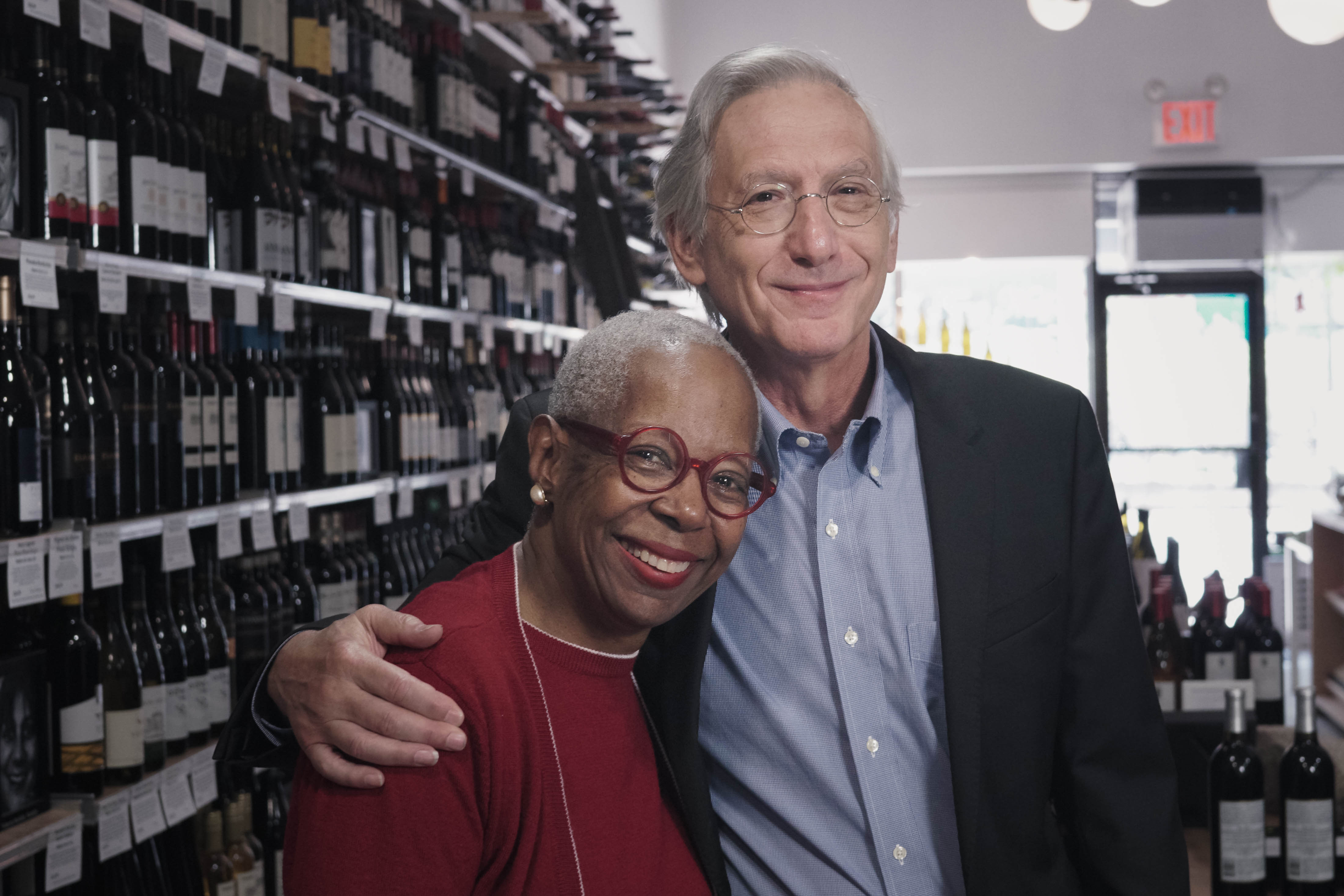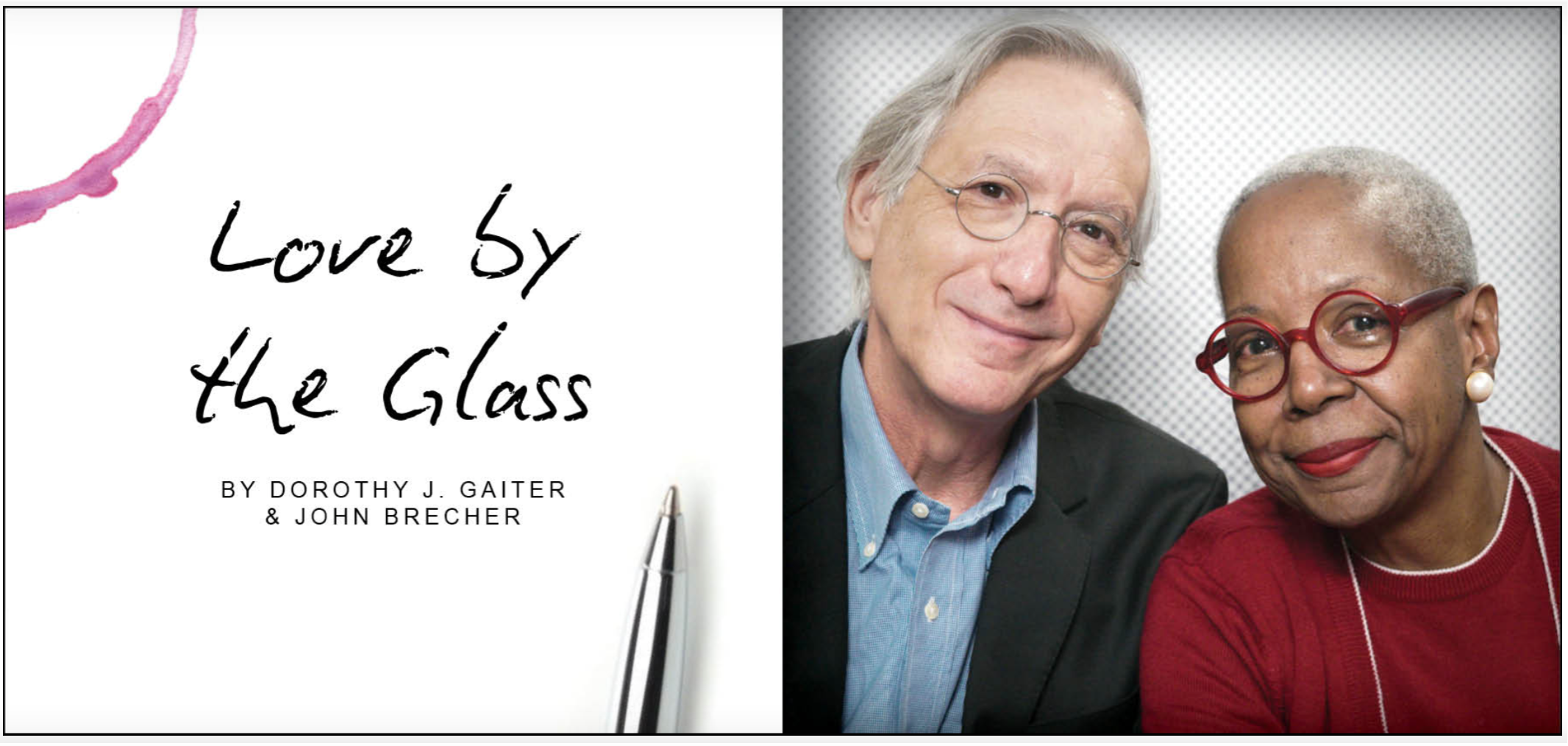
Some of the best wine experiences are waiting for you at restaurants, and not just fancy ones with ginormous wine lists. We know that markups at too many places are outrageous. But if you are willing to take a little bit of a risk and seek the unknown, you could find a memorable bottle in that neighborhood joint where you don’t expect it, something you might never buy or even see at a store. This just happened to us.
When John started college, a very long time ago, the first restaurant he went to was a Greek spot called Symposium, near the campus of Columbia University. His friend Lou suggested it. John’s family didn’t often go out to eat and, in any case, Jacksonville, Fla., was not a hotspot for Greek cuisine. Lou spoke Greek, so when they walked down a couple of steps to this informal, friendly place, they were treated like family.
When we were dating in the 1970s, John took Dottie to Symposium during our first visit to New York. There’s artwork all over the walls and ceilings, sturdy wooden tables and reasonably priced Greek comfort food. We have been visiting Symposium ever since and it has not changed much.
We went a couple of weeks ago. The wine list, as always, was all-Greek. In the past, we’ve often had a carafe of the pleasant house wine because, really, how often do neighborhood places offer carafes of house wine anymore? But we looked at the short wine list this time and it seemed particularly interesting. One wine caught our eye: a rosé called APLA from Oenops Wines. Since we’d never seen it before, we decided to take the leap. It was $37, which is reasonable for a bottle of wine in a Manhattan restaurant.
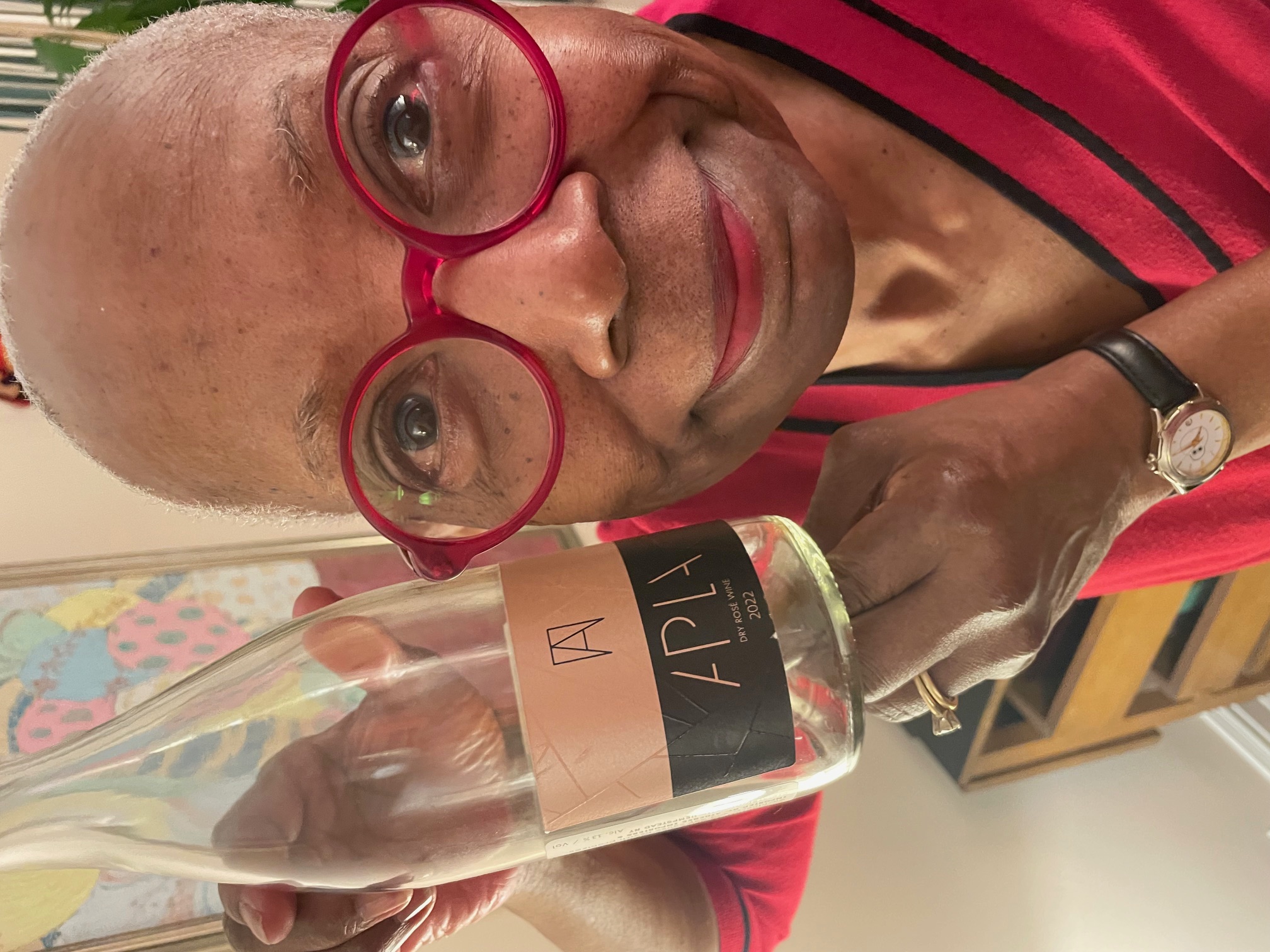 When the clear bottle came, the wine looked very inviting, a light watermelon color. On the label’s side, in English and Greek, was a quotation attributed to Charlie Chaplin: “Simplicity is not a simple thing.” The label said the wine was made from Xinomavro, a well-known Greek grape; and two lesser-known others, Limniona and Mavroudi. It was 2022.
When the clear bottle came, the wine looked very inviting, a light watermelon color. On the label’s side, in English and Greek, was a quotation attributed to Charlie Chaplin: “Simplicity is not a simple thing.” The label said the wine was made from Xinomavro, a well-known Greek grape; and two lesser-known others, Limniona and Mavroudi. It was 2022.
(Dottie with Greek rosé)
The waiter opened the bottle, gave us each a taste and then left it for us to pour. We were immediately taken. The wine was dry with a clarity and a fresh juiciness to it. The blend of unfamiliar grapes appealed to us as authentic, a different, mouth-watering experience. There was nothing obvious about it. It was almost ephemeral, certainly unusual in our experience with rosé. We both wondered if this would fit into today’s category of “natural” wines, though the label said nothing about that.
After a few sips, Dottie, who has always had the better palate and nose, looked at John quizzically and said, “Tomato?” John said, “Oh my Gosh. Yes! Tomato! Thomas Keller!”
That might seem a leap, but that’s how we talk about wine. Some years ago, we had a light tomato dish at the French Laundry in Napa – we can’t remember if it was a consommé or maybe even a sorbet. But it expanded our appreciation of how tomatoes could taste and smell, with an earthy elegance that seemed impossible to touch.
We don’t think we have ever written “tomato” as a tasting note on a wine.
As our first course at Symposium, we always have a plate of feta cheese, black olives and wedges of warm pita. With the rosé, it was a remarkable pairing. The pleasantly sour, tangy and earthy salinity of the cheese and fleshy olives with the sleek acidity of the wine was gorgeous. Last summer, we had another stunner from Greece, Troupis Winery’s 2021 Hoof & Lur skin-contact Moschofilero, that also sang beautifully with food.
It was clear we needed to know more about Oenops Wines. It turns out that it was founded in 2015 in Drama by winemaker Nikos Karatzas. He only uses indigenous grapes, sourced from various regions. The wine we had was half Xinomavro, 30% Limniona and 20% Mavroudi. Each was fermented separately, in stainless steel and concrete.
Athenee Importers, which handles Oenops in the U.S., says it imports about 1,300 cases from the winery, of which about 600 cases are the rosé. They are distributed in major markets. The rosé sells for about $20.
We were eager to hear more, so we contacted Karatzas by email. We write often about how good wines reflect the soul of the winemaker and, if you ever doubt that, meet Nikos Karatzas. The following has been edited:
Grape Collective: Tell us a little about yourself.
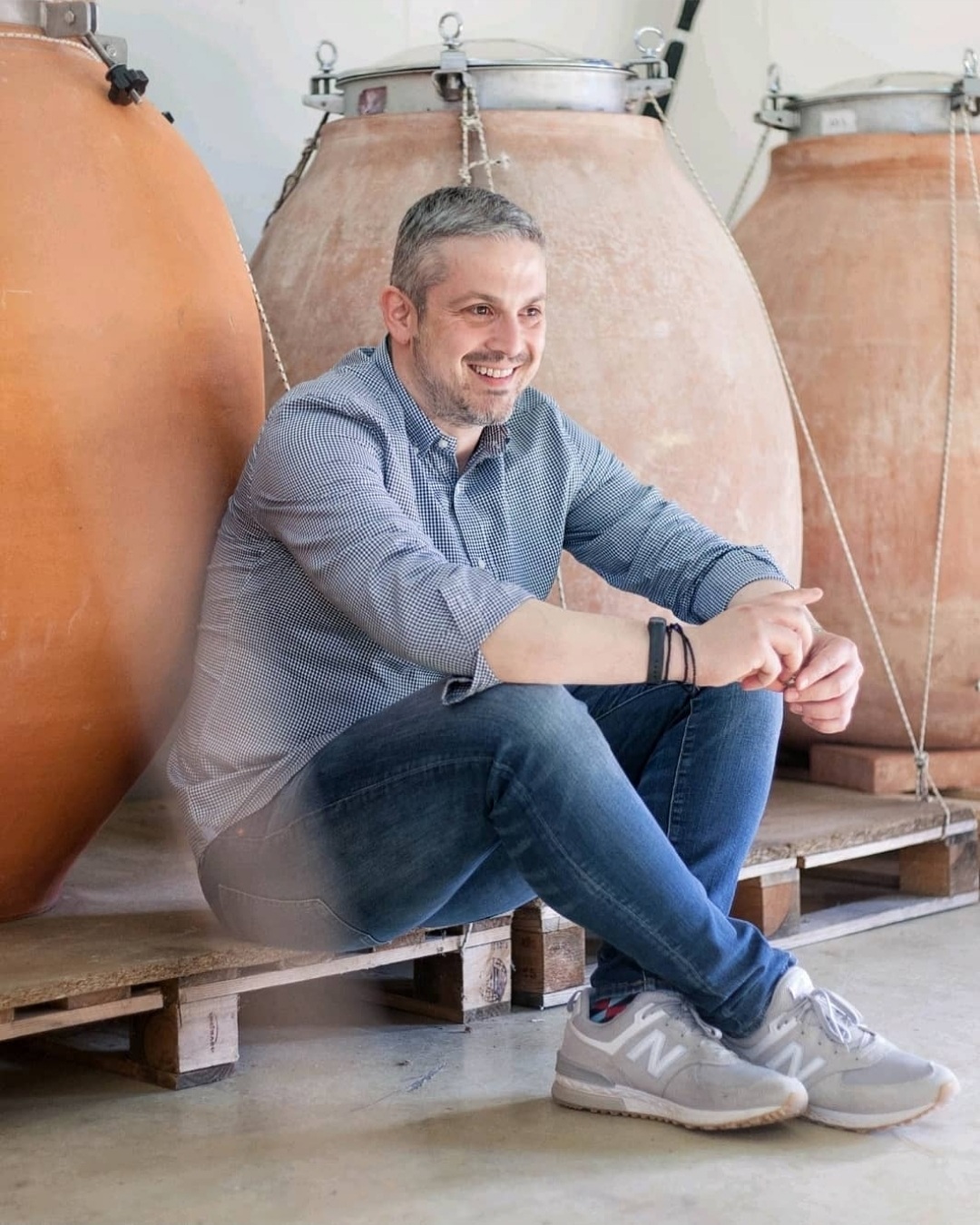 Karatzas: I am 46 years old. I studied chemical engineering in Thessaloniki and then moved to Bordeaux for 2.5 years to become an Oenologist at the famous Institut d’Oenologie. Living in France gave me the opportunity to become passionate for wine and winemaking of high-quality wines. Upon my return to Greece, I worked for 10 years at Ktima Pavlidis as a winemaker and a CEO of the company, participating in one of the biggest success stories in recent Greek winemaking.
Karatzas: I am 46 years old. I studied chemical engineering in Thessaloniki and then moved to Bordeaux for 2.5 years to become an Oenologist at the famous Institut d’Oenologie. Living in France gave me the opportunity to become passionate for wine and winemaking of high-quality wines. Upon my return to Greece, I worked for 10 years at Ktima Pavlidis as a winemaker and a CEO of the company, participating in one of the biggest success stories in recent Greek winemaking.
(Nikos Karatzas)
GC: Your site says you founded Oenops in 2015 and it is the youngest winery in the Drama region. It must be a huge risk to start a winery. What inspired you to do it?
Karatzas: It is a fact that starting a winery is a huge risk, especially in Greece in 2015, with the huge debt and political crisis we had at that time. I was deeply inspired at that moment by the Greek varieties. I noticed that Greece, although a small country in terms of surface, shows a great diversity of terroirs and microclimates. Meeting the right people -- growers that were as passionate as I am, with organic philosophy in their minds -- gave me the energy and vision to found Oenops Wines. We aim to produce authentic, fruit forward, delicious wines that may add value to the precious moments of people. We always want people to feel that our wines have bigger value than the price they paid.
GC: How much wine do you make, in total? We read that you purchase fruit, but do you also own any vineyards now?
Karatzas: We produce almost 200,000 bottles, sold in both the domestic (55%) and export market (45%) in almost 20 countries. We are based exclusively on grapes that we source from our growers; we own no vineyards. We are proud to follow this model that is based in collaboration, by principle. It feels great to share our knowledge and love for vineyards, with the love and experience of the growers for their vineyards.
GC: We loved the Charlie Chaplin quotation on the label. Why did you use that?
Karatzas: APLA in Greek means “simply.” These wines represent our philosophy in producing wines to be enjoyed. Wine is a pleasure, and not something we need to have to survive. We enjoy wine, either alone or with others (mostly). It is part of our well-being, which is a very important part of our being in general. We want people to enjoy drinking our wines, to travel through the sips to Greece, even for a moment. That’s the simplicity of wine: it can travel you for a moment. At that moment, people don’t know that, for example, APLA white needed 32 different lots to be vinified, or APLA rosé 24, to give this harmonious result they are enjoying; they just enjoy the wine -- that simple. After all, wine may help us simplify life.
GC: Do you consider it a natural wine?
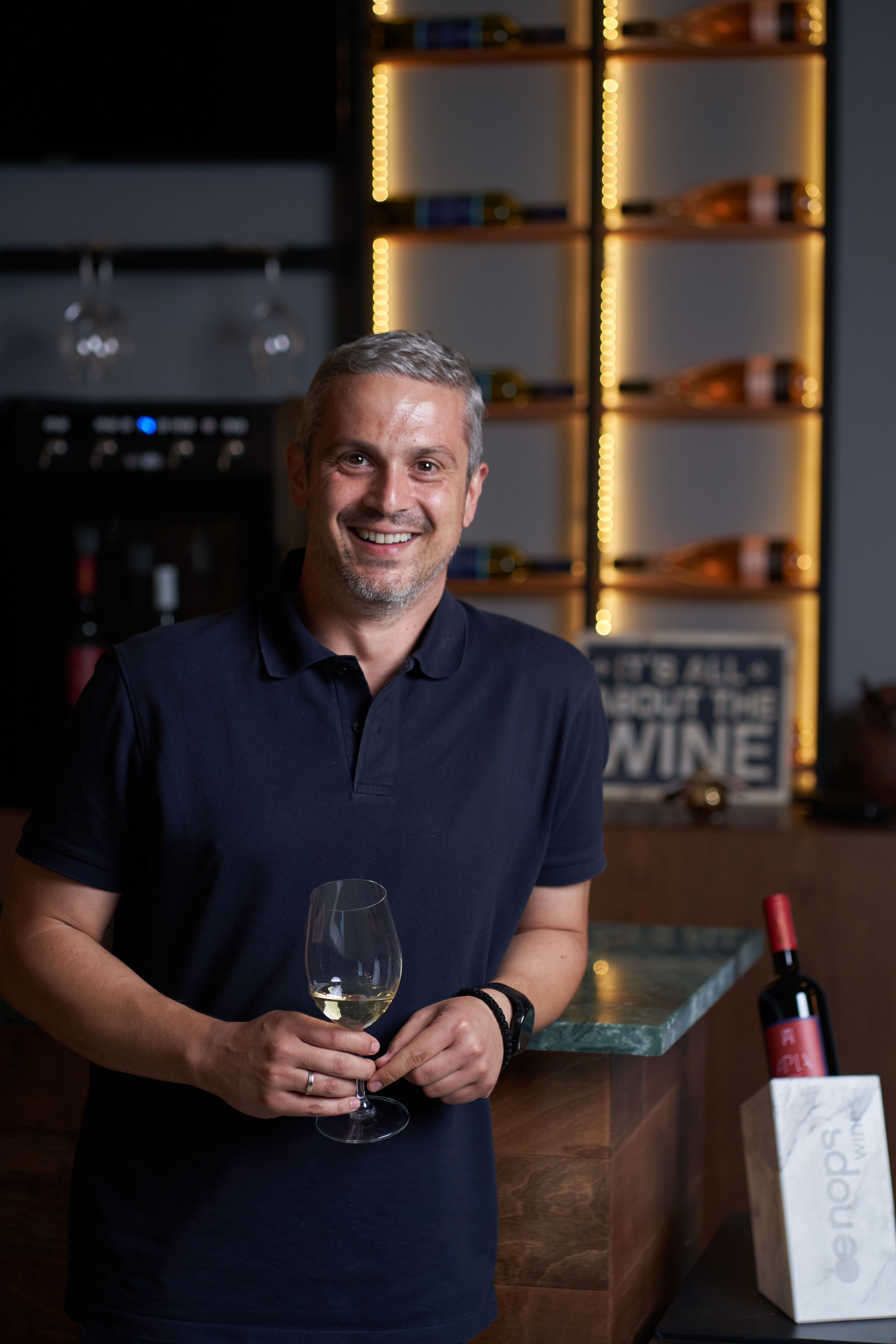 Karatzas: In all three APLA wines (white, rosé and red), the purest expression of each variety, from each plot harvested, is our guide. We carry mostly spontaneous fermentations in our winery for that goal; minimal intervention is a beautiful challenge for us, as we work in every detail in order to become “invisible,” if possible, in terms of intervening.
Karatzas: In all three APLA wines (white, rosé and red), the purest expression of each variety, from each plot harvested, is our guide. We carry mostly spontaneous fermentations in our winery for that goal; minimal intervention is a beautiful challenge for us, as we work in every detail in order to become “invisible,” if possible, in terms of intervening.
GC: We started our meal with a plate of feta and black olives and with the wine we were in heaven.
Karatzas: This is the ultimate goal for a wine: to match harmoniously with food, place and moment and travel people’s mind.
GC: One element we sensed was tomato. We then saw that your winery also uses tomato in its description. Where does that come from?
Karatzas: Tomato leaf is a common descriptor for Xinomavro grapes. We sense it sometimes in the APLA rosé, and in the APLA red, as Xinomavro is the main variety in these blends.
GC: Xinomavro is known in the U.S., but the other two varieties seem pretty obscure. Are they rare? What do they contribute to the blend?
Karatzas: We source grapes from several regions of the north part of Greece. We have chosen primarily poor soils and cool climate areas. Limniona and Mavroudi are less known than Xinomavro. It is a beautiful challenge to work with them, and much easier now, after working together with our growers for 7-8 years. The result makes us proud, as they contribute their qualities into the wines. In the APLA rosé, they add beautiful red fruit on the nose, some extra volume and layers in the mouth.
Greek varieties are the past and the future of Greek wines for me. Our goal is to make the best of it in the present.
Dorothy J. Gaiter and John Brecher conceived and wrote The Wall Street Journal's wine column, "Tastings," from 1998 to 2010. Dorothy and John have been tasting and studying wine since 1973. In 2020, the University of California at Davis added their papers to the Warren Winiarski Wine Writers Collection in its library, which also includes the work of Hugh Johnson and Jancis Robinson. Dottie has had a distinguished career in journalism as a reporter, editor, columnist and editorial writer at The Miami Herald, The New York Times, and at The Journal. John was Page One Editor of The Journal, City Editor of The Miami Herald and a senior editor at Bloomberg News. They are well-known from their books and many television appearances, especially on Martha Stewart's show, and as the creators of the annual, international "Open That Bottle Night" celebration of wine and friendship. The first bottle they shared was André Cold Duck. They have two daughters.
Banner by Piers Parlett
